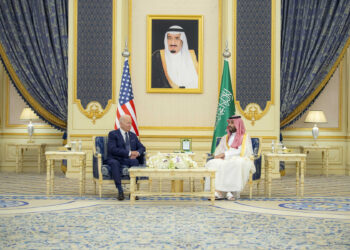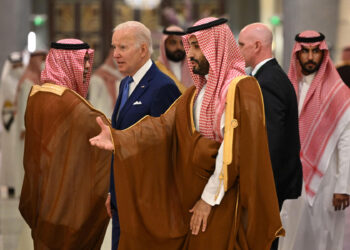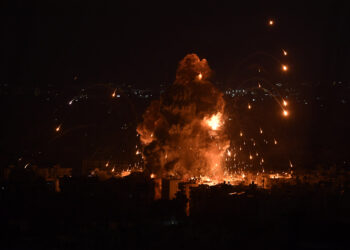Omid Memarian, a journalist, analyst and recipient of Human Rights Watch's Human Rights Defender Award, is the Director of Communications at DAWN.
In late March, Francesca Albanese, the United Nations special rapporteur on the human rights situation in the occupied Palestinian territories, presented a report to the U.N. Human Rights Council on Israel's war in Gaza. Titled "Anatomy of a Genocide," it concluded that there were "reasonable grounds" to believe Israel had crossed the threshold of committing genocide against Palestinians in Gaza. The report argued that Israel's political and military leadership were intentionally distorting international humanitarian law in an attempt to "legitimize genocidal violence against the Palestinian people."
After the release of the report, which Israel rejected, Albanese said publicly that she had received threats since her appointment as U.N. special rapporteur in 2022. The Biden administration, which opposes Albanese's mandate, also rejected her conclusions about genocide, while a State Department spokesperson smeared her as antisemitic.
"The Israelis will have to come to terms with what they have done to the Palestinians," Albanese tells Democracy in Exile in an extensive interview. "I don't think that they realize it yet." As for the United States, she says: "It's incredible to me that the place which has some of the most renowned, reputable universities, including in disciplines like international law, has a government which is so detached, if not adversarial to international law."
An Italian lawyer and academic, Albanese is the first woman to serve as the U.N. special rapporteur on the occupied Palestinian territories, an independent expert position created by the U.N. Human Rights Council in 1993 to monitor, advise and report on human rights situations in specific countries. (She succeeded Michael Lynk, a law professor who is now a non-resident fellow at DAWN). She is an affiliate scholar at the Institute for the Study of International Migration at Georgetown University and a senior adviser on migration and forced displacement for the think tank Arab Renaissance for Democracy and Development, where she co-founded the Global Network on the Question of Palestine, a coalition of scholars and professional working on Israel-Palestine. From 2003 to 2013, Albanese worked as a human rights expert for the United Nations, including the Office of the High Commissioner for Human Rights and the UNRWA Department of Legal Affairs, based in Jerusalem. Her book Palestinian Refugees in International Law, co-authored with Lex Takkenberg, was published in 2020. She holds a law degree with honors from the University of Pisa and an LLM in human rights from SOAS University of London.
Albanese recently spoke to Democracy in Exile about her genocide report, the urgent need for a cease-fire in Gaza, and the lack of humanity for Palestinians. "I did not realize that there was such a deep, entrenched racism in our societies that prevents us from looking at the Palestinians as ordinary human beings," she says.
The following transcript has been edited lightly for length and clarity.
In genocide, it's difficult to prove intent. But as I said to the Human Rights Council, when the intent is so conspicuous, so ostentatious as it is in this war, what are you looking for? Every day there is evidence.
- Francesca Albanese
As somebody who has been smeared with accusations of antisemitism since taking up your role as special rapporteur, what do you make of the efforts to define criticism of Israel as antisemitism?
The accusation of antisemitism is very painful. Very painful. And it will never come without the scar because antisemitism is disgusting. It's disgusting today, it was disgusting years ago, and it can continue to be disgusting, as any form of racism or discrimination against the other based on whatever reasons, including Islamophobia. Antisemitism, because of the history, it's heavy on me. At the same time, I had to develop a thick skin because this is the normal accusation leveled against anyone who dares to scrutinize Israel's practices. I know it's a technique to deflect attention from the content of my work, so I tend to ignore it.
What advice do you have for others who might be facing similar smears?
Stay strong, stay focused, build alliances, and don't get scared. Be louder, speak louder and louder.
Twenty years ago, if a special rapporteur was denied access to a country—like Israel has denied you access to the Palestinian territories—it would have become very difficult to do your work. But now that has changed with social media.
Correct. For example, the fact that there is so much video evidence that has been circulated by Israeli soldiers themselves, much of which is self-incriminatory, for what concerns Gaza. You always have to be careful, because certain things can be fabricated, which this is why whatever I receive, I have to verify the information.
You have been facing enormous political pressure within the U.N. system and from the U.S. directly. How does that pressure manifest in your day-to-day work and ability to report accurately, fairly and frankly on what you're seeing?
I do not receive pressures from within the United Nations in the sense from the organization. No, I don't receive much support beyond the Secretariat support that which the Commissioner for Human Rights provides. My greatest support circle is the special rapporteurs family—independent experts. They are amazing. They are the ones who have really stood up for me all the time. Other than that, I feel the solidarity of individuals, U.N. officials, especially the younger generation—not the high-ranking ones.
The rest of the United Nations is what it is. Member states, the pressure is indirect, in the sense that there is the non-cooperation, which is not good. A number of states have taken very strong personal issues with the way I act—because I'm a pain in the neck. I mean, they consider me a pain in the neck, and probably I am. I'm very straightforward. I call a spade a spade. I call out their hypocrisy and out of despair, because I cannot accept that human beings are treated like bags of potatoes, just to quote an ambassador I heard recently saying.
Other than that, the pressure is the continuous, relentless smears and attacks. It comes more from these so-called NGOs. They are more like GONGOs [government-organized non-governmental organizations], governmental organizations who parrot whatever the Israeli government says and act like the sheriffs in town.
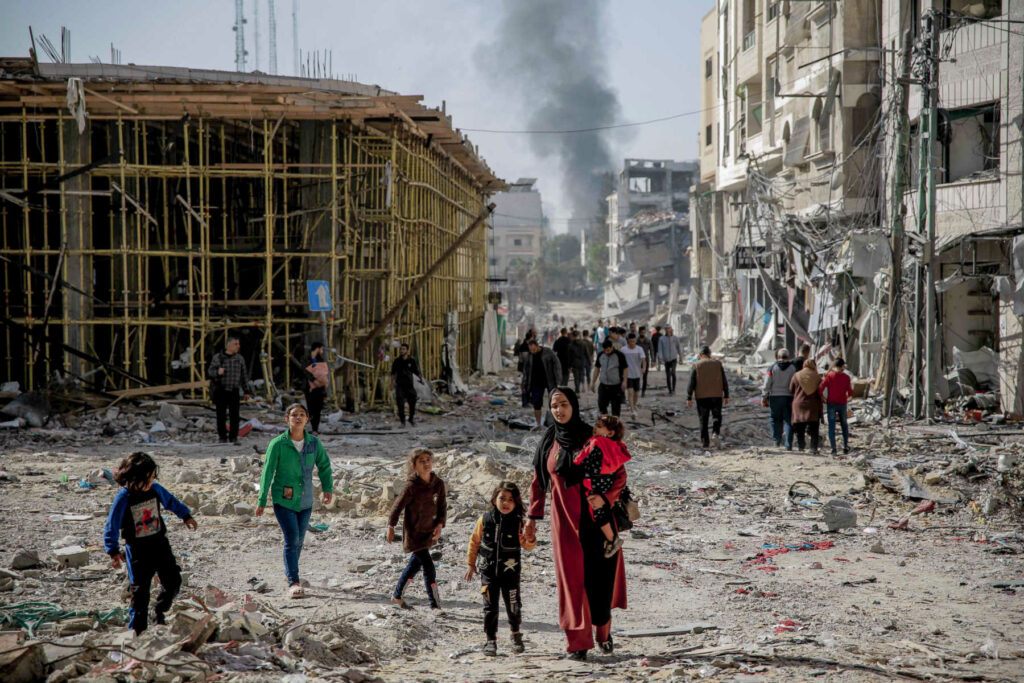
How about the U.S. government?
What the young generation cannot stomach today, on top of what they see happening in Gaza, and to the Palestinians in general, is the huge failure of the United Nations, the fact that the United Nations cannot function. But I can tell you that the United States get along with the U.N. system as long as it serves its interests. Otherwise, they don't feel part of it, as they don't feel part of international law. It's incredible to me that the place which has some of the most renowned, reputable universities, including in disciplines like international law, has a government which is so detached, if not adversarial to international law. This is my impression, especially after two years as a special rapporteur.
What is the implication of such an approach?
Double standards and exceptionalism, which is intolerable and unsustainable. I'm sorry, we are not in the pre-decolonization era. It's true that the Global South might still be weaker in terms of economic power, in terms of influence, but there is also a global youth. I don't know how this has formed, because I'm not a sociologist, but for the first time in my life, I do see a global consciousness. And it's made of principles. It's informed. It's empathetic. Of course, there are always extremisms here and there. But the majority of people taking to the streets, speaking out, setting up encampments in universities today—they want justice. They want equality. Which is exactly the opposite of the system as it stands today: exceptionalism and double standards.
You have found that there are "reasonable grounds" to conclude that Israel is committing genocide in Gaza. Can explain your view on that?
I believe that Israel has committed at least three acts of genocide: Killing members of a protected group, the infliction of severe bodily and mental harm to members of that group, and the creation of conditions of life that would lead to the destruction of the group. In genocide, it's difficult to prove intent. But as I said to the Human Rights Council, when the intent is so conspicuous, so ostentatious as it is in this war, what are you looking for? Every day there is evidence. There are mass graves, one after the other. There are summary executions, broadcasted or captured in video and shared on social media by the very soldiers. The mass destruction of neighborhoods, mosques, churches, universities. Why so? This has been sustained by a hatred and an eliminatory animus against the Palestinians.
It's ingrained in the history of the Palestinian people that even before the creation of the State of Israel, Palestine and Palestinians have been seen as a threat to Israel. It's so clear that they represent the threat because Israel continues to have a mission toward what remains of the territory of historical Palestine, including the Gaza Strip, the West Bank and East Jerusalem. So as long as these people stay there, preventing Greater Israel, there will always be a push for ethnic cleansing.
Israel, this time, has committed genocide as a crime prohibited by the Genocide Convention, by justifying—this is what I call humanitarian camouflage—by justifying its crime as international humanitarian law-abiding. It has killed the people, saying they are all Hamas. They are Hamas, we have killed the Hamas combatants—without even knowing who they were killing or knowing that they were killing civilians. They assume the risk and they justify this by saying they were human shields, or they were collateral damage. Bombing people when they were in safe zones. Forcing them to live without food, without water, without medicines. If this is our creation of conditions of life, that will lead to the destruction of people. If this is not infliction of severe bodily or mental harm, what is it?
The Israelis will have to come to terms with what they have done to the Palestinians. I don't think that they realize it yet. Whenever the dust settles, then everyone will see.
- Francesca Albanese
You have called for sanctions and an arms embargo on Israel.
This is not a new call. I think that sanctions on Israel were necessary as a peaceful set of coercive measures. Some coercion on Israel needs to be exercised, because Israel clearly doesn't feel bound by international law, by U.N. resolutions, and what we are facing today are the extreme consequences of decades of tolerated and protracted impunity. So now it's even more urgent than before to have the sanctions—especially because Israel is violating the International Court of Justice's provisional measures that have recognized the plausibility of risks to the rights of Palestinians protected under the Genocide Convention, meaning the plausibility of risk of genocide. Those measures were binding. The fact that Israel has violated those measures would trigger states' obligation to take all possible measures toward prevention of genocide, and therefore, measures against Israel.
What does Israel need to do to comply with the International Court of Justice's provisional measures in its ruling on genocide in Gaza, in the case brought by South Africa? What actions need to be taken to ensure that Israel complies with these measures?
There have been measures on the 26th of January and on the 28th of March. The most important are that Israel is to refrain from committing acts that would amount to those prohibited under the Genocide Convention that I listed: the killing, the infliction of harm and the creation of conditions of life that could lead to the destruction of the Palestinians in Gaza as a protected group. And preserving the evidence of any possible crime, which clearly Israel is not doing. The investigation and prosecution of a number of identified state officials for genocidal incitement, and this has not happened. And ensuring unfettered humanitarian aid to the people of Gaza. These are the most important measures—and none of that has been observed. When it comes to humanitarian aid, not only has Israel not ensured access to that relief itself, as it would be obliged to do as an occupying power, it has obstructed the international community from doing so. It has shelled the convoys of trucks transporting aid, including the people who were desperately trying to reach much-needed aid as they were thirsty and hungry.
If Israel refuses to cooperate with international courts like the ICJ, with the support of the U.S., is this the end of international justice?
I don't know if it's the end. But it's such a low point for international law and the international justice system that it could be the confirmation that it's really not worth the investment—for example, for the local human rights communities who have invested so much in documenting violations and abuses, including relevant to this the Rome Statute, and they see nothing.
What role could the U.S. play in holding Israel accountable? Do you see the recent changes in tone from the Biden administration, and its hold on sending a shipment of large bombs to Israel, making any difference on the ground?
It's a good development, and I hope it continues. The reason why I'm skeptical is that there is a good word today, an annoyed word tomorrow, a good word the day after, and then another annoyed word the following day. So it seems to me that when criticism is leveled at Israel, it's not sincere. And in any case, Israel doesn't listen to anyone. It has said it through the voice of its ministers, and it has done it. Israel never listens to anyone unless measures are taken.
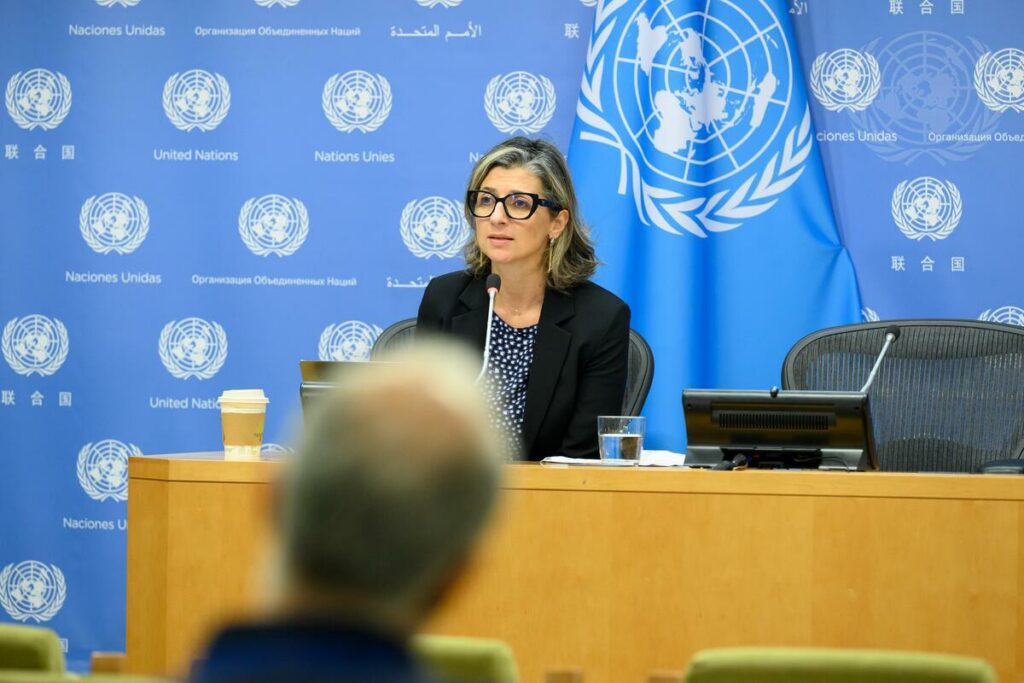
There have been reports recently that the International Criminal Court may issue indictments soon against Israeli and Hamas officials. What are your thoughts on the ICC's work to date?
How do I assess or judge the work of the ICC? It's late, it's very late. The ICC, there is no question, has been dragging its feet, one way or another for procedural reasons or political reasons. The fact is that there were enough elements to advance a much-needed investigation on Israel's responsibilities before the 7th of October, because it's true that this is a deterrent from the commission of crimes. Instead, the inaction, the lack of effectiveness of the ICC, has corroborated the perception that Israel was untouchable. Therefore, it has also enhanced or rather fed the sense of impunity the Israeli leadership had. Things might be changing now. Let's see.
How could the ICC be more effective? What are the things they could do that they are not doing now?
Assigning a proper investigation and starting to send out arrest warrants—because it's clear that crimes have been committed, I would say on both sides, but they're not the same. For sure, Hamas and other Palestinian armed groups have committed heinous crimes against Israelis, that goes without saying. And the Israeli army and Israeli armed settlers and the State of Israel have committed heinous crimes against the Palestinians before the 7th of October, and after.
One of your reports recognizes "the inherent illegality of the Israeli occupation of the Palestinian territory, including East Jerusalem"—an issue that is now being argued before the ICJ in another case, as you know. Can you explain the basis and legal framework for your conclusion that Israel's occupation is illegal?
Israel has for a long time disputed, first of all, the fact that the occupied Palestinian territory is occupied because it calls it "disputed." It lives in its own reality, in its own interpretation of international law. But in the real world, what is true is that Israel has maintained an occupation for now almost 57 years, an occupation that has been used as a vehicle for colonizing the land and taking the resources, or simply displacing the people. It's committing violations of international humanitarian law on a daily basis. So Israel's occupation is unlawful because it violated repeatedly and protractedly international humanitarian law. It has existed as part of an apartheid regime, which is unacceptable and criminal. It has frustrated the right of self-determination of the Palestinian people. And there are scholars who argue that this can lead to the qualification of the occupation as a form of aggression against the Palestinian people. Also, because basically, this occupation is against the best interest of the Palestinians as the occupied population. It's not justified by military necessity. It's just justified by security needs, meaning the need to secure expansion of the colonies.
There are two pending pieces of legislation in the U.S. that relate to Israel. Under one, the Antisemitism Awareness Act, the federal government would police campus speech, using the International Holocaust Remembrance Alliance's narrow definition of antisemitism, which incorrectly equates criticism of Israel with antisemitism and conflates Judaism with Zionism. Another bill would give the Treasury Department broad new powers to revoke the nonprofit status of an organization, 90 days after making the unilateral determination that it supports terrorism. The bill appears targeted at U.S. groups critical of Israel. What do you make of these efforts in the U.S. to curb freedom of speech?
I see two things. First of all, it's astonishing how far against its own values and basic democratic tenets the U.S. is going to go in order to favor Israel. And the second thing is that I hope that the American people understand how much of their rights and freedoms are being sacrificed in the name of defending a foreign country. It's incredible.
How do you think the student protests on U.S. campuses are seen from the outside world?
What is happening on U.S. campuses is reinvigorating the entire world, after South Africa. South Africa gave us hope. And this young generation—I call it the watermelon revolution—also gave us hope, because they asked for justice. They simply asked for justice. There might be an element of agitators among them, and there might be people with a different agenda other than being peaceful. But the majority of them have very clear asks: for divestment of their university, whose fees they pay, from Israel's enterprise; to have transparency; to have a proper education, including about Palestine, which is necessary; and to stop practicing anti-Palestinian racism. This is basically what they are asking, in all its forms. I think it's very moving and inspirational.
Israel has now started its ground invasion of Rafah. What steps does the international community need to take at this moment? Are there any steps?
They have to stop Israel. A cease-fire is not a recommendation; it must be imposed from outside through all possible means. There is no other way. We need to save lives, both lives of the Palestinians in Gaza and the lives of the hostages. There is no other way to protect the hostages. It's been used as a rhetorical argument empty of meaning, because if the priority had been the hostages, Gaza would not have been turned into rubble. And many Palestinians will still be alive or not in mutilated bodies. The only thing that is needed in the immediate is a cease-fire.
Given how close you are to this issue, what do many other people—for example, in Europe or in the U.S., in Washington, in the media—not see about what is happening in Gaza?
They don't see the Palestinians. They don't see the Palestinians as human beings. They don't. They see a mass—faceless, dreamless. They have no idea. They have no idea. This is the thing that troubles me, and it's very painful. There has been a huge deception. I did not realize that there was such a deep, entrenched racism in our societies that prevents us from looking at the Palestinians as ordinary human beings who go to school, who go shopping, who have had their homes—from the birthday cards, to the musical instruments, to wedding pictures, to clothes, everything they had—destroyed. The lives of hundreds of thousands of people have been destroyed. And 17,000 children orphaned. This number is just so shocking.
I talk to people sometimes and they keep on saying, yeah but, what happened on the 7th of October? First of all, there is no but. And the 7th of October, I keep on saying, would not have happened had Israel's impunity been put under check before, because it's the hatred that we have seen unleashed against Israeli civilians, which was brutal. It was horrific, there is no question about that. And I will never condone it, of course. I will never justify it, of course. But at the same time, what has spread the hatred is the years of bombing, killing, destroying with impunity. It is the years of jailing the Palestinians in Gaza that has turned some of the people into these individuals full of rage and vengeance.
Ultimately, we have to manage to bring the Palestinians and the Israelis to a place of compassion and mutual understanding. They need to see each other, see their humanity. But again, they are not equal. The Palestinians are the ones who have been subjugated, their rights and freedoms forfeited. The Israelis will have to come to terms with what they have done to the Palestinians. I don't think that they realize it yet. This is probably also the irrational fear in the Israeli war cabinet right now. Whenever the dust settles, then everyone will see.

